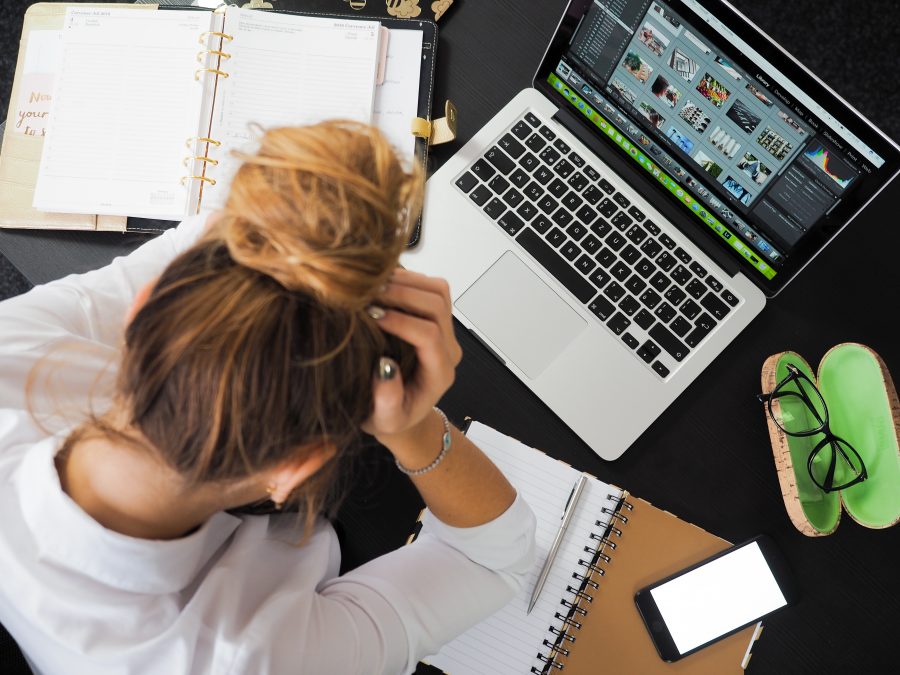When you’re running your own business, self-doubt is the last thing you want to be dealing with. Here, Phoebe Dodds gets advice from two entrepreneurs who’ve been through it and come out the other side.

Working for yourself is hard. There’s the need to be insanely self-disciplined, to be able to cope with the loneliness of working from home, ride out financial instability and tackle the self-doubt that inevitably rears its ugly head from time to time. For those who work in a company, feedback sessions with your boss where your achievements are laid out and discussed explicitly, and you know whether or not you’re on track to achieve your goals are a regular occurrence. For freelancers (who often operate with a more flexible/ad hoc approach) it’s all too easy to fall into the imposter syndrome trap and women who work for themselves are often the ones who suffer from it the most. That’s not to say that men are completely immune – far from it – but the truth is in the statistics: 66% of women have reported experiencing imposter syndrome, compared to only half of men. So what can we do about it?
Sharing your creative output with the world, especially if that’s what you do for a living, is no small task. It takes guts and resilience, particularly in the age of social media, where people feel free to bash you in the comments section from behind the safety shield of their keyboard. When I was 18, I wrote an article for The Guardian about my decision to study in Amsterdam instead of at Cambridge. The majority of the comments were brutal, taking issue with editorial decisions I had absolutely nothing to do with, but for which I received all of the blame. If putting your work out there for all to judge is your livelihood, you have to find ways of dealing with the self-doubt.
Take a break
Alina Tang, an Australian artist and workshop host focusing on printmaking, floriography, and design, recommends taking an active approach to combating self-doubt. Tang’s partner is also a freelancer, so he knows what it’s like to feel hesitant about your professional output and abilities. “He’s an incredible support for me, encouraging in every way, also reminding me to take breaks, get out of the studio to go for a walk, have days off every now and then, and not feel the guilt of having to work every single minute of the day,” she explains. Perspective is everything, and if you find yourself sitting at your desk getting caught up in a negative spiral of self-doubt, remove yourself from your working environment for a couple of hours and do something totally different to clear your mind.
Speak to your peers
Tang also recommends connecting with others in the same boat as you to share experiences and provide mutual support: “I try my best to meet other creative women and share my struggles – I think being transparent and knowing that other people are feeling similar things helps a lot. I think if we can get through things together and know that we’re not on our own, that helps,” she says.
Be your own cheerleader
Mia Georgis is an actor and playwright in London, focusing on queer British-Iraqi work. Georgis thinks that self-doubt as a freelancer originates from the fact that there are so many ways to reach the same professional point. “You’re always finding people who are doing the same sorts of things as you, but who haven’t had the same path as you. So you’re almost checking yourself against them, thinking am I on the right path? Am I doing enough?”, she says. Georgis also points out that some self-doubt can be good – as long as you work out how to use it in a positive way. She always tries to start her day in a positive way, “almost working to get all that self doubt out”. Georgis recommends “writing a list of what I call a love diary where you write positive affirmations like ‘I can write this play’” or anything that’s particularly relevant to your work. “I know it sounds silly, but I think it’s really helpful – you have to counter these things, and you have to counter them through the act of speech or writing,” she advises.
Stop comparing
Tang and Georgis both point out that comparison is the freelancer’s Achilles heel. Tang describes feeling incredibly critical of her own work, partly due to “guilt that comes from comparing myself with others on different journeys, but still feeling like I should be at a certain point in my career,” she explains. Georgis agrees, and suggests taking inspiration from others, without directly comparing yourself. “Approach it from the perspective of ‘I find it interesting what that person’s doing, let me see what they did before”.
At the end of the day, self-doubt is something that doesn’t just go away – it needs to be worked through. Tang and Georgis both advise talking to others about how you’re feeling. That’s something Georgis wishes she knew at the start of her freelance journey: “if you actually ask and reach out to people, it’s so surprising how many actually respond – and a lot of people don’t realise that”.
Although it can be tough at times, working for yourself is an enormous gift. Not everyone is able to enjoy the freedom, flexibility and diversity that the freelance lifestyle provides, so self-doubt shouldn’t be putting too much of a dampener on the experience. If you’re really struggling to the extent that it affects your ability to work, consider investing in a couple of sessions with a therapist, who can provide tips for reframing your thoughts. And if self-doubt is something that only creeps up on you at key times, such as when your latest project is going live, remember that it’s a completely normal part of the human experience, and an issue that can be slowly chipped away at with the help of your personal support network.

